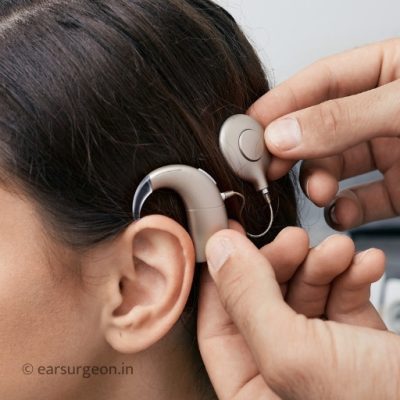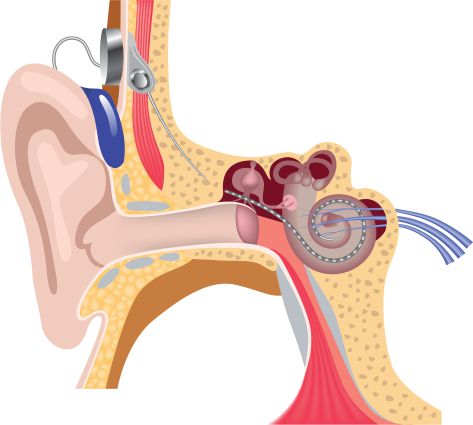The working of cochlear implants

What are cochlear implants
Cochlear implants are electronic devices that reduce hearing loss. Although cochlear implants do not restore one’s hearing, they can improve his / her ability to comprehend speech and hear other sounds. The cochlear implants consist of an outer portion that sits behind one’s ear and a second portion that is surgically placed under the skin.
Cochlear implants have the following parts:
Microphone
Its function is to pick up sounds from the environment.
External sound processor
Its function is to select and arrange sounds picked up by the microphone.
Transmitter and receiver / stimulator
Its function is to receive signals from the external sound processor and transform them into electric impulses.
Electrode array
Its function is to collect the impulses from the stimulator and send them to different regions of the auditory nerve.
Request an Appointment

How cochlear implants work
Cochlear implants are very different from hearing aids. Hearing aids operate by amplifying sounds so they may be detected by one’s damaged ears. On the other hand, cochlear implants bypass damaged portions of the inner ear, creating a new passage for sounds to make their way to one’s brain.
Consult Dr. Shree Rao – Best Cochlear Implant Specialist in Hyderabad
Cochlear implants work as follows:
- One is needed to wear an external sound processor that sorts the sound coming into his / her outer ear.
- The external sound processor sends signals to a transmitter attached to one’s scalp with a magnet.
- The array of electrodes in one’s cochlea collect the impulses and send them on to the auditory nerves.
- The auditory nerves then transfer these nerve impulses to one’s brain.
Steps to getting a cochlear implant
Hearing Test
One needs to undergo a hearing test to determine whether he / she is a candidate for a cochlear implant. This test examines the extent of one’s hearing loss, including his / her ability to hear sound and comprehend speech both with and without hearing aids. It basically checks the connection between one’s ear and brain.
Surgery
Cochlear implant surgery is a two to four hours outpatient procedure performed in a hospital or clinic, using general anesthesia.
Activation
After two to four weeks of the surgery, one is requested to visit his / her ENT specialist or audiologist to get the cochlear implant activated and programmed to start listening through the device.
Post Surgery
Post the surgery, one needs to work with his / her ENT specialist or audiologist to help make adjustments and fine tune the device.
Ongoing rehabilitation and care
One needs to undergo rehabilitation to retrain his / her mind to understand sounds. It helps in speeding up the process of healing and learning.
Cochlear implants for adults
Cochlear implants are the best choice for adults suffering from moderate to profound sensorineural hearing loss in one or both ears. Unlike hearing aids, cochlear implants are created to produce clearer sound and help one understand what is being said.
It is a myth that one has to be completely deaf to get a cochlear implant. One may be able to hear some sounds even without hearing aids and still be eligible for a cochlear implant surgery. Cochlear implant surgery has proven to be a successful solution for those in their 80’s and 90’s.
- Difficulty in spoken communication due to hearing loss
- Limited benefits from hearing aids
- Desire to participate in hearing rehabilitation
- Ability to hear speech
- Ability to recognise everyday environmental sounds
- Ability to hear in noisy environments
- Ability to identify the source of sound
- Ability to hear television programmes and music
- Ability to have telephone conversations
Cochlear implants for children
Cochlear implants are a savior for children suffering from severe to profound hearing loss.
- Auditory perception of sounds at levels within the normal range of hearing
- Ability to understand speech
- Clarity of sound
- Better language skills
- Ability to hear in noisy environments
- Improvement in quality of life
- Better educational outcomes
- Difficulty in following simple commands or understanding directions
- Easily frustrated
- Experiences communication breakdowns
- Lacking with speech and communication skills
- Failing to understand what others are saying, unless directly looking at them
- Exhausted from concentrating to understand speech at school
- Displays signs of behavioral problems or social difficulties
- Difficulty in keeping up at school



